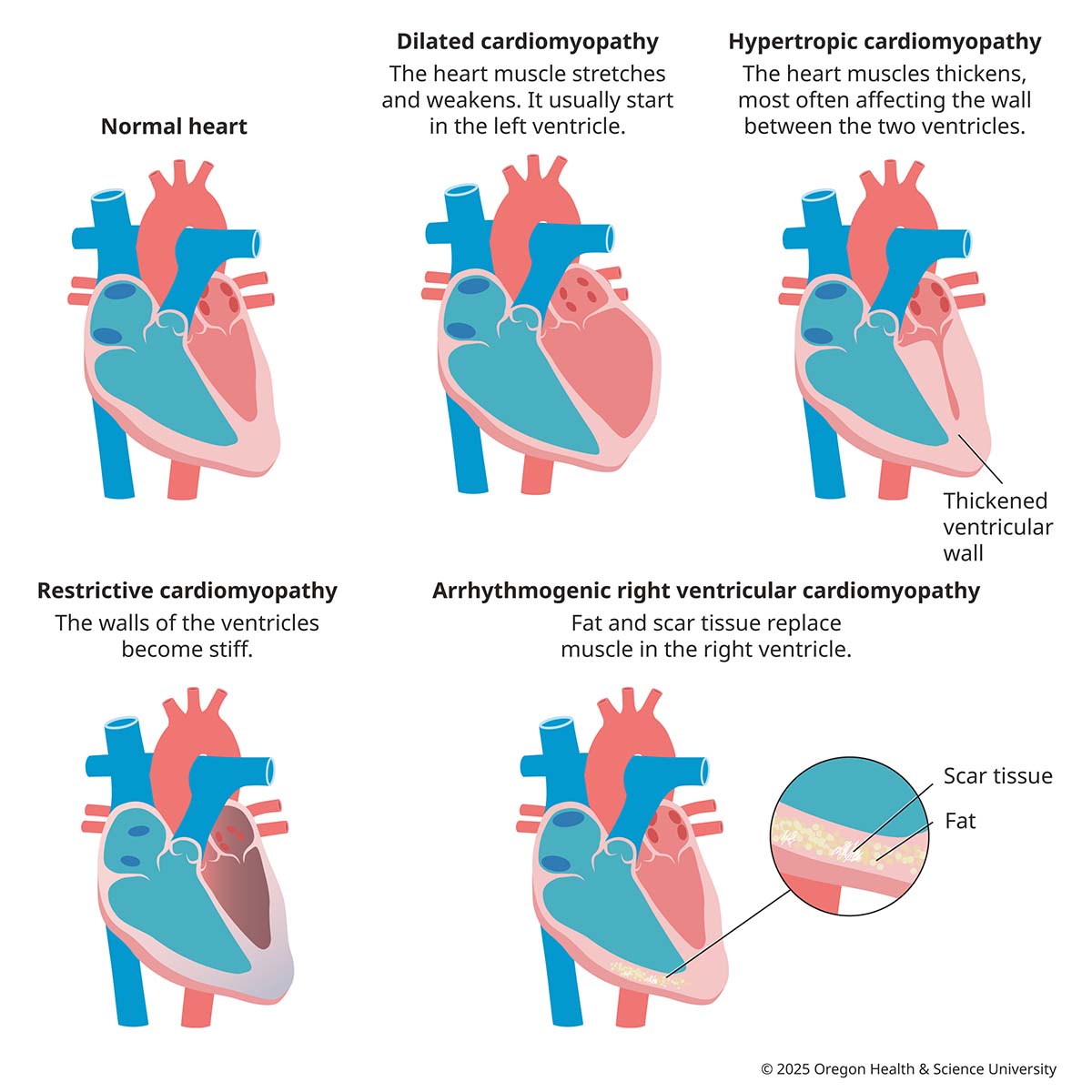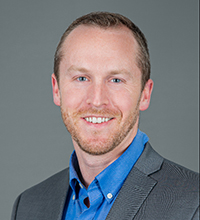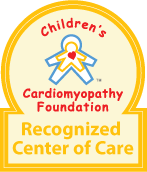Pediatric Cardiomyopathy and Heart Failure

OHSU Doernbecher Children’s Hospital provides complete, team-based care for children with thickened, weak or enlarged hearts. We also offer a smooth transition to adult care when needed.
Our cardiomyopathy and heart failure program includes:
- The largest, most experienced team of children’s heart specialists in Oregon and southwest Washington.
- Critical-care doctors on duty 24/7 to care for children with failing hearts.
- Advanced imaging and testing for a quick, accurate diagnosis.
- The latest treatments and techniques to help your child feel better faster.
- Genetic testing and counselors to identify relatives who might be at risk.
- Oregon’s only specialty clinics for treating pediatric cardiomyopathy and heart failure.
Learn about cardiomyopathy and other acquired heart conditions in children.

treating children with thickened heart muscles, co-leads
Doernbecher’s cardiomyopathy program.
Team-based care
We have three children’s heart specialists who are experts in cardiomyopathy and heart failure:
- Dr. Patrick Evers treats children with enlarged hearts (dilated cardiomyopathy).
- Dr. Seshadri Balaji treats children with thick hearts (hypertrophic cardiomyopathy) and muscle disease that mostly affects the right side of the heart (arrhythmogenic right ventricular cardiomyopathy).
- Dr. Laurie Armsby treats children with transplanted hearts.
Your child’s care team also may include specialists in:
- Heart failure
- Heart rhythm
- Heart catheterization
- Heart surgery
- Imaging
- Genetics
- Intensive care
- Other related health issues
Complete care: Our pediatric specialists work with experts at the OHSU Knight Cardiovascular Institute to care for children with hypertrophic cardiomyopathy, a complex form of cardiomyopathy, as well as heart failure. We also communicate and coordinate between our team and OHSU’s Pediatric Neuromuscular Program for patients with neuromuscular diseases.
Care near home: As Oregon’s only academic health center, OHSU is a statewide resource for pediatricians, parents and children with cardiomyopathy and heart failure. Our specialists can talk with your child’s doctor so your child can receive much of their care in your community.
Our excellence
OHSU is the only hospital in the Northwest named a Center of Excellence by the Hypertrophic Cardiomyopathy Association. The honor recognizes our expertise, experience and technology.
Diagnosing cardiomyopathy and heart failure
Types of Cardiomyopathy

Cardiomyopathy can affect the heart in many ways. It can limit blood flow and cause irregular heart rhythms. In serious cases, it can lead to heart failure. We use a range of tests to understand your child’s unique heart structure, blood flow and rhythm. This helps us recommend the most effective care plan.
At Doernbecher, you’ll find:
- State-of-the-art diagnostic techniques, including advanced cardiac imaging.
- Child-friendly labs designed for comfort and safety.
- Coordinated testing in our on-site labs for faster results.
- A family-oriented approach to inherited cardiomyopathies.
- Scientists who take part in national studies to improve the care of children with cardiomyopathies.
Your child’s tests may include:
- Echocardiogram
- Heart rhythm testing, such as:
- An electrocardiogram
- An electrophysiology study
- A portable monitor
- Exercise tests
- Heart catheterization
- CT (computed tomography) scans
- Cardiac MRI (magnetic resonance imaging)
- Genetic tests
Genetic and clinical testing for your family: Cardiomyopathy often runs in families. Your care team may recommend tests, including genetic testing, for close relatives. Identifying others who are at risk may prevent serious heart problems. Our experienced and certified genetic counselors can explain options.

Heart failure care
When a child has heart failure, the heart becomes weak. The heart is unable to work well, even with medication. It has trouble pumping blood through the body. This condition can range from mild to severe, and it can worsen over time.
Our goal is to slow the progress and postpone the need for a heart transplant as long as possible. We offer the latest treatments in a child-friendly environment.
Types of heart failure
Patients with heart failure often fall into these categories:
- Children with structural heart defects caused by congenital heart conditions. After a series of surgeries, their heart muscles can become scarred, losing the ability to pump.
- Children with acquired heart conditions that develop after birth, such as dilated cardiomyopathy. In these children, the heart becomes enlarged and weak. Viruses also can damage the heart muscle in older children and adults. Sometimes a heart condition that develops after birth has a genetic cause.
Understanding treatment options
Treatment for cardiomyopathy and heart failure depends on the type and specific symptoms. Our doctors are national leaders in cardiomyopathy research and can bring the latest advances to your child’s care.
Treatments may include:
Monitoring: Children with mild forms may not need treatment. We will provide regular tests and doctor visits to catch any problems early.
Medication: A variety of medications can help a child’s heart beat regularly and efficiently. Many children can stay on medication for a long time and need no other treatment. Your child’s doctor will talk with you about which medications are best for your child.
Pacemaker: If medication doesn’t keep a child’s heart rhythm under control, the care team may recommend implanting a pacemaker in the chest. This small device sends electrical signals to keep the heart beating at a regular rate.
Implantable cardioverter defibrillator (ICD): If a child is at risk of a sudden life-threatening heart rhythm problem, a surgeon can implant a small ICD device in the chest. If the heart stops or beats out of control, the ICD shocks it back into a regular rhythm.
Myectomy: If the heart muscle is too thick (hypertrophic cardiomyopathy), it can obstruct blood flow out of the heart. During a myectomy, a surgeon removes some of the extra muscle to improve blood flow. Many children feel much better after the surgery, and it can help them live longer. Learn more about OHSU’s hypertrophic cardiomyopathy program, the only one in Oregon.
Specialized heart failure treatment
Children with heart failure may need additional, specialized treatments.
Heart catheterization: Our catheterization specialists and electrophysiologists are experts in using this minimally invasive option to:
- Evaluate heart failure by measuring the pressure and blood flow in the heart and lungs.
- Repair some defects and arrhythmias that can lead to heart failure.
- Obtain biopsies (removing a small tissue sample) to make sure a transplanted heart is working well.
Surgery: Our two children’s heart surgeons often work together in the operating room, sharing expertise to give your child the best possible care.
Intensive care: Our Pediatric Intensive Care Unit (PICU) provides expert critical care for children with severe heart failure.
Transfer to a heart transplant center: No center in Oregon transplants children’s hearts or places ventricular assist devices (VADs) in children waiting for a heart transplant. If your child has advanced heart failure, we will help you transfer to a transplant program.
Resources that can help
- Pediatric Heart Failure Guidebook (PDF), Children’s Cardiomyopathy Foundation
- Family Resources, Children’s Cardiomyopathy Foundation
- Duchenne Muscular Dystrophy, Muscular Dystrophy Association
- ACTION Learning Network

Locations
Doernbecher Children’s Hospital
700 S.W. Campus Drive
Portland, OR 97239
Find other locations across Oregon and in southwest Washington.
Free parking for patients and visitors
Refer a patient
- Refer your patient to OHSU Doernbecher.
- Call 503-346-0644 to seek provider-to-provider advice.
Refer a patient
- Refer your patient to OHSU Doernbecher.
- Call 503-346-0644 to seek provider-to-provider advice.